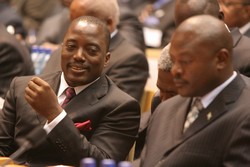President Joseph Kabila (left) |
NAIROBI, 10 Jan 2007 (IRIN) - The international community should continue its support for the new government in the Democratic Republic of Congo (DRC) to help it overcome serious security and political challenges, the International Crisis Group (ICG), a Brussels-based think-tank, said on Wednesday.
"The political process is not finished," despite general elections in the country in 2006, a senior ICG analyst in charge of Central Africa, Jason Stearns, said in the Kenyan capital, Nairobi, during the launch of ICG's latest report on the DRC.
The international community supported the DRC before and during the elections that culminated in the inauguration of President Joseph Kabila on 6 December. The DRC's electoral process cost an estimated US $500,000, most of it supplied by international donors.
The ICG report, 'Congo: Staying Engaged After Elections', recommends establishing new international structures to support the peace process after the dissolution of the International Committee for Supporting the Transition, known as CIAT, which was based in the capital, Kinshasa.
The ICG said some donors and the Congolese government want to replace the CIAT with a technical structure focusing on development and humanitarian aid, and to treat most aid matters on a bilateral basis. This would weaken the international community's capacity to support democratic practices and safeguard other peace process achievements, ICG said.
The 2006 democratic elections in the DRC, the first in more than 40 years, marked the country's transition to democracy and development after years of civil war, which officially ended in 2003 but the east has remained volatile due to militia activity.
The country was likely to face post-electoral challenges such as an opposition weakened by a pro-government judicial and legislative system and corrupt institutions, as well as the security risk of an ill-disciplined national army and active militias in the eastern and northeastern part of the country, the ICG said.
Stearns said with donors funding at least 60 percent of the DRC's budget, they should play a greater role in the political process.
"Donor funds should be tied to key political benchmarks," he said. "Rebuilding the DRC is not primarily a technical endeavour but also a political one."
"MONUC [the United Nations mission in the DRC] should be given a political mandate to support security-sector reform and state institutions such as the judiciary and parliament," Stearns said.
With the security situation in eastern DRC remaining volatile, ICG recommended the maintenance of the 17,000 MONUC troops in 2007 to secure the country.
Stearns said there were an estimated 8,000 foreign rebels in eastern DRC and a similar number of Congolese militia. "At the heart of the problem remains the issue of how to deal with the militia," he said. "There is also widespread indiscipline and brutality against civilians by the army."
Moreover, Stearns said despite the transition to democracy, the country risked sliding towards authoritarianism, with Kabila's control of most state institutions posing the main risk. "Kabila has already started marginalising the opposition in parliament," he added.
The opposition's influence has been severely limited by procedural rules passed by Kabila's Alliance de la majorité presidentielle coalition, excluding parties from most, if not all, significant positions, ICG said in the report. The coalition holds a strong majority in parliament, controlling about three-fifths.
aw/lo/mw/js
Related articles
- • Felix Tshisekedi Sworn In as DR Congo President (January 24, 2019)
- • Constitutional Court Declares Tshisekedi Winner of Presidential Election (January 19, 2019)
- • Felix Tshisekedi Vows to Be the President of All Congolese (January 10, 2019)
- • Felix Tshisekedi Elected DR Congo President (January 10, 2019)
- • DR Congo Delays Results of December Election (January 6, 2019)
- • Botswana Urges Joseph Kabila to Step Down (February 26, 2018)
- • No elections in DR Congo in December without electronic voting machines: INEC (February 13, 2018)
- • US Warns DR Congo Against Electronic Voting for Delayed Election (February 12, 2018)
- • Felix Tshisekedi accuses INEC of illegally prolonging Kabila's mandate (October 24, 2017)
- • DRC Seeks Arrest of Presidential Candidate Moise Katumbi (May 19, 2016)
- • Papa Wemba Is Buried in Kinshasa (May 4, 2016)
- • Papa Wemba Awarded Highest National Honor as Thousands Pay Tribute (May 2, 2016)
- • Rights Groups: DR Congo Must Free Pro-democracy Activists (April 13, 2015)
- • Police Open Fire on Crowd Protesting Election Law Change (January 19, 2015)
- • Etienne Tshisekedi Evacuated to Belgium for Medical Treatment (August 16, 2014)
- • Kerry Calls on Kabila to Honor Constitution (May 4, 2014)
- • Kerry in DR Congo for Security Talks (May 3, 2014)
- • DR Congo Takes Chairmanship of COMESA at Summit in Kinshasa (February 26, 2014)
- • New DR Congo amnesty law welcomed by UN envoys (February 5, 2014)
- • DR Congo, M23 Rebels Sign Declarations Marking End of Kampala Peace Talks (December 12, 2013)
- • DR Congo Honors Nelson Mandela, Hero and Model for Humanity (December 6, 2013)
- • Kabila Congratulates Congo Army for Defeating M23 Rebels (October 30, 2013)
- • DR Congo Eases Process for Starting a New Business (June 3, 2013)
- • Regional Leaders Sign DR Congo Peace Deal (February 24, 2013)
- • The M23 Rebels Want to Overthrow Kabila? Nonsense (November 28, 2012)
- • Thousands of Women March Against M23 Rebels in Kinshasa (November 24, 2012)
- • Protests Against M23 Rebels, Government and UN Spread (November 22, 2012)
- • Thousands Protest M23 Capture of Goma, Turn on Government and UN (November 21, 2012)
- • DR Congo Officials Vow to Defend Goma Against M23 Rebels (November 19, 2012)
- • At high-level meeting, Ban urges political solution to crisis in eastern DR Congo (September 27, 2012)
Tags: |








